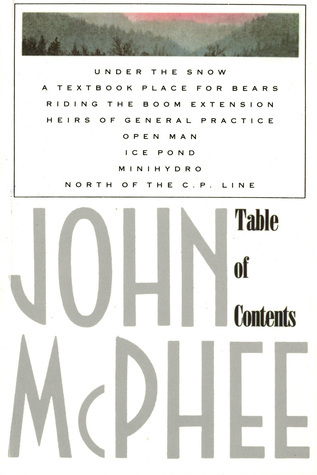What do you think?
Rate this book


304 pages, Paperback
First published January 1, 1985
The scene strongly brings to mind a stack of magazines tied up with string in an attic. It strongly brings to mind that medical superman of yesteryear, the old doc on the cover of The Saturday Evening Post with his stethoscope planted on the chest of a child's doll, the old doc who rode from house to house through deep snows with his black bag beside him and his roan gelding pulling the sleigh, the old doc who did appendectomies on the kitchen table, the old doc who worked nine days a week and rested on the tenth.
Turbines designed for low-flow situations would be wasteful in times of high water. Turbines designed for high efficiency at, say, five hundred cubic feet per second might be ineffective in times of low water. Under certain conditions, turbines can go into a state of cavitation, wherein vaporizing water creates bubbles that implode on the metal and riddle it with tiny holes. The ideal turbine for a little mill up a creek somewhere in inconsistent country would be one that was prepared to take whatever might come, to sit there and react calmly in any situation, to respond evenly to wild and sudden demands, to make the best of difficult circumstances, to remain steadfast in time of adversity, to keep going, above all to press on, to persevere, and not vibrate, fibrillate, vacillate, cavitate, or panic - in short, to accept with versatile competence what is known in hydroelectrical engineering as the run of the river.
I will believe anything about deer. Deer, in my opinion, are rats with antlers, roaches with split hooves, denizens of the dark primeval suburbs. Deer intensely suggest New Jersey. One of the densest concentrations of wild deer in the United States inhabits the part of New Jersey that, as it happens, I inhabit, too. Deer like people. They like to be near people. They like beanfields, head lettuce, and anybody’s apples. They like hibiscus, begonias, impatiens, azaleas, rhododendrons, boxwood, and wandering Jews. I once saw a buck with a big eight-point rocking-chair rack looking magnificent as he stood between two tractor-trailers in the Frito-Lay parking lot in New Brunswick, New Jersey. Deer use the sidewalks in the heart of Princeton.